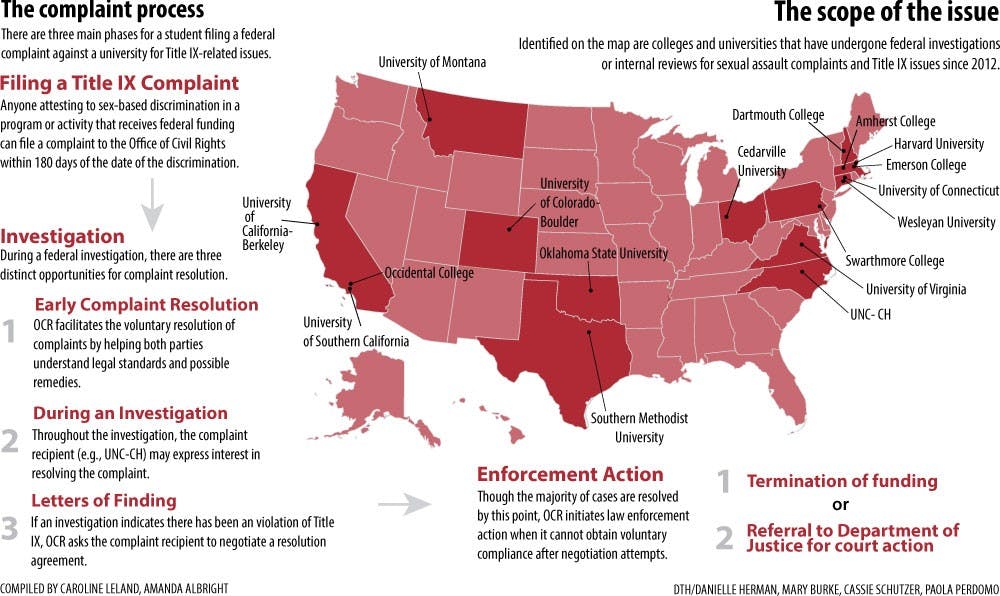“OCR is required by law to seek voluntary resolutions of civil rights violations before initiating enforcement action,” Bradshaw said in an email. “Resolution agreements, negotiated by both parties and monitored by OCR, are the primary means of resolving cases of noncompliance.”
Of the 2,912 Title IX allegations related to any sex discrimination issue that OCR received from October 2012 to September 2013, 62 related to sexual violence. These numbers represent all levels of education, not just college.
During a nearly identical time period, OCR resolved 313 of its total 9,952 complaints, which are not all related to sexual assault, through the early complaint resolution process.
UNC spokeswoman Susan Hudson said in an email that federal privacy law does not allow the University to comment on specific cases.
“We have and will continue to cooperate fully with the Office for Civil Rights, as we have said since the beginning,” she said in the email.
Pino said it’s unclear what compensation — if any — would come from such a settlement. Bradshaw could not provide an example of compensation because early complaint resolution settlements are always confidential.
Pino said the Department of Education has had to deal with a heavy onslaught of Title IX-related complaints filed against U.S. colleges and universities this year — complaints she said followed in the tracks of her own.
All of the investigations were suspended during the federal government shutdown Oct. 1 to Oct. 16.
Bradshaw said in an email that there is no backlog of cases at OCR.
But Pino said she is concerned by the department’s ability to quickly field all the complaints it receives because she thinks it needs a larger staff.
“How are we supposed to hold the 5,000 colleges we have in the country accountable if you don’t even have a full staff?” Pino said. “There needs to be more effort into supporting these really important departments.”
Pino said she is glad her case prompted such a spike in sexual assault complaints, but it’s a double-edged sword because she is worried the cases will take longer to process.
To get the day's news and headlines in your inbox each morning, sign up for our email newsletters.
UNC graduate Annie Clark, who filed the complaint against UNC with Pino, said she would decline if offered an early complaint resolution because it takes focus off UNC’s handling of the case.
“I think on the aggregate of what I’ve seen … it kind of takes it down to the individual level,” she said. “It doesn’t rectify the situation.”
Clark said a private, out-of-court resolution might have the effect of silencing sexual assault survivors and taking the topic of sexual assault out of the public discourse.
As a social justice activist, Clark said settling in private is not as effective.
“What we’ve seen change-wise happen is media scrutiny and people talk about it, but as soon as you settle, it stops,” she said.
Clark said an early complaint resolution might be worthwhile to a freshman or sophomore complainant because that person would have more to gain from compensation provided by the University — if it were something like a new job or help with tuition.
Pino said she chose to decline the early complaint resolution offer because her goal is not to gain monetary or other compensation.
“That’s not why I filed this complaint,” she said. “I did this for the bigger good of my fellow Tar Heels.”
Pino said the offer was also confusing because it was vague and did not guarantee compensation.
“You’re only guaranteed a conversation with the school … a conversation which your school should be having in the first place,” she said.
Pino said the decision of whether to choose early complaint resolution is up to the individual, but she is concerned that it doesn’t bring full justice.
“My concern with the Department of Education’s proposed solution process is that it kind of pushes a settlement,” she said. “I want the school to be held accountable. I want the school to know what went wrong in the investigation.”
university@dailytarheel.com




